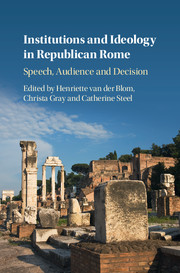Book contents
- Institutions and Ideology in Republican Rome
- Institutions and Ideology in Republican Rome
- Copyright page
- Dedication
- Contents
- Contributors
- Acknowledgements
- Abbreviations
- Introduction
- Part I Modes of Political Communication
- Part II Political Alliances
- Part III Institutions in Theory and Practice
- Part IV Memory and Reputation
- Chapter 14 Like Father, Like Son?
- Chapter 15 Good Fortune and the Public Good
- Chapter 16 Gaius Verres Troubleshooter
- Bibliography
- Index
Chapter 14 - Like Father, Like Son?
The Dynamics of Family Exemplarity and Ideology in (Fragmentary) Republican Oratory
from Part IV - Memory and Reputation
Published online by Cambridge University Press: 08 May 2018
- Institutions and Ideology in Republican Rome
- Institutions and Ideology in Republican Rome
- Copyright page
- Dedication
- Contents
- Contributors
- Acknowledgements
- Abbreviations
- Introduction
- Part I Modes of Political Communication
- Part II Political Alliances
- Part III Institutions in Theory and Practice
- Part IV Memory and Reputation
- Chapter 14 Like Father, Like Son?
- Chapter 15 Good Fortune and the Public Good
- Chapter 16 Gaius Verres Troubleshooter
- Bibliography
- Index
Summary
- Type
- Chapter
- Information
- Institutions and Ideology in Republican RomeSpeech, Audience and Decision, pp. 267 - 282Publisher: Cambridge University PressPrint publication year: 2018
- 1
- Cited by



